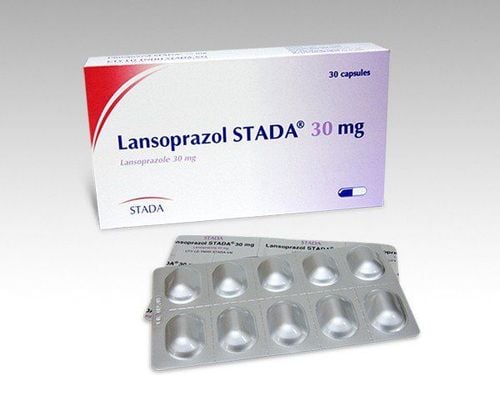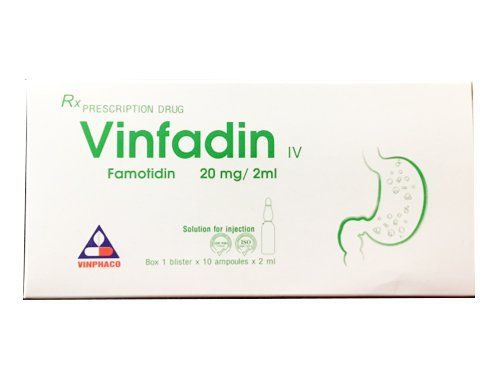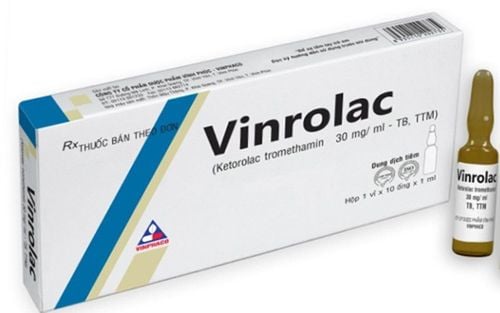This is an automatically translated article.
Zopanpra is made in the form of enteric coated tablets, the main ingredient is Pantoprazol. It is used in the treatment of erosive esophagitis and gastric acid hypersecretion.
1. What is Zopanpra?
What is Zopanpra? 1 Zopanpra tablet contains 40mg of Pantoprazol (as pantoprazol sodium) and other excipients. Pantoprazole belongs to the class of proton pump inhibitors. The drug enters the acid-secreting tubules of the stomach wall to be converted to the active form of sulfenamide. This form binds irreversibly to the enzyme H+/K+ ATPase present on the surface of the gastric parietal cells, inhibiting this enzyme and preventing the final step of acid secretion into the gastric lumen. Therefore, Pantoprazol has the effect of inhibiting gastric acid secretion under normal circumstances and also when the stomach is irritated.
After an initial oral dose of 40 mg Pantoprazol, gastric acid secretion will be inhibited by about 51% after 2.5 hours. Taking Pantoprazol 40mg/time/day for 7 days will reduce gastric acid secretion by 85%. Gastric acid secretion returns to normal within 1 week of discontinuation of pantoprazole and there is no return of acid secretion. In addition, Pantoprazol also works to eliminate Helicobacter pylori in the stomach of patients with duodenal ulcer or reflux esophagitis infected with this bacterium.
Indications for use of Zopanpra:
Short-term treatment of erosive esophagitis associated with gastroesophageal reflux disease: Zopanpra is indicated for short-term treatment (up to 8 weeks) in patients with erosive esophagitis. people 5 years of age and older to heal wounds and relieve symptoms of erosive esophagitis; Maintenance treatment of ulcerative erosive esophagitis: Zopanpra is indicated for the maintenance treatment of ulcer healing of erosive esophagitis and for the relief of recurrent daytime and nocturnal heartburn symptoms in humans. adults with gastroesophageal reflux disease; Long-term treatment of pathological hypersecretory conditions, including Zollinger-Ellison syndrome. Contraindications to the use of Zopanpra:
Patients with hypersensitivity to active ingredients, excipients or combined components of the drug; Combination therapy with Atazanavir.
2. How to use and dose Zopanpra
Usage: Orally. The patient should swallow the tablet whole, do not break, chew or break the tablet. Zopanpra can be taken before or after meals. Concomitant administration of this drug with antacids also does not affect the absorption of the drug:
Dosage:
Short-term treatment of erosive esophagitis associated with gastroesophageal reflux disease: Adults: Dose of 40 mg/time/day, may be increased up to 8 weeks. In adults with ulcers that do not heal after 8 weeks of treatment, the course of treatment can be extended by 8 weeks; Children from 5 years old and above, over 40kg: Use a dose of 40mg/time/day, which can be increased up to 8 weeks of treatment; Maintenance treatment to heal ulcers of erosive gastritis: Adults take a dose of 40mg/time/day; Conditions of pathological hypersecretion of acid, including Zollinger - Ellison syndrome: Adult dose 40mg/time x 2 times/day. Overdose: Not much is known about proton pump inhibitor overdose in humans. Overdose symptoms may be vasodilation, drowsiness, slightly tachycardia, headache, confusion, blurred vision, abdominal pain, nausea and vomiting. Treatment is gastric lavage, activated charcoal and symptomatic treatment combined with supportive treatment. At the same time, it is recommended to closely monitor cardiac activity and blood pressure in the patient. If the patient has persistent vomiting, fluid and electrolyte status should be closely monitored.
3. Side effects of Zopanpra
In general, pantoprazole is well tolerated with either short-term or long-term treatment. However, the drug reduces the acidity of the stomach, so it can increase the risk of gastrointestinal infections. When using Zopanpra, patients may experience some side effects such as:
Common: Dizziness, fatigue, headache, skin rash, urticaria, dry mouth, nausea, vomiting, flatulence, abdominal pain, diarrhea, constipation, muscle pain, joint pain; Uncommon: Asthenia, dizziness, lightheadedness, insomnia, skin pruritus, elevated liver enzymes; Rare: Sweating, peripheral edema, anaphylaxis, malaise, acne, alopecia, maculopapular rash, exfoliative dermatitis, erythema multiforme, angioedema, stomatitis, belching, dyspepsia chemistry, blurred vision, photophobia, insomnia, somnolence, tinnitus, agitation or inhibition, confusion, tremor, hallucinations, paresthesia, eosinophilia, thrombocytopenia, decreased leukopenia, agranulocytosis, impotence, impotence in men, interstitial nephritis, hematuria, hepatitis, jaundice, encephalopathy in people with liver failure, hypertriglyceridemia, hyponatremia,... Patients should promptly inform their doctor about the side effects encountered when using Zopanpra for prompt and appropriate intervention.
4. Precautions when using Zopanpra
Before and during the use of Zopanpra, patients should note:
In patients with Zollinger-Ellison syndrome or other disorders associated with pathological hyperacidity that require prolonged treatment, Pantoprazol may reduces absorption of vitamin B12, leading to a decrease or decrease in hydrochloric acid. This should be considered if the patient has clinically relevant symptoms; Before administering pantoprazol or other proton pump inhibitors to the stomach, the possibility of gastric cancer should be excluded because this drug may mask symptoms, leading to a delay in the diagnosis of cancer; Pantoprazol should be used with caution in patients with liver disease (acute, chronic or with a history of liver disease). Serum concentrations of the drug may be slightly increased and elimination may be slightly reduced, but no dose adjustment is required. Zopanpra should not be used in patients with cirrhosis or severe liver failure. If used, it is necessary to reduce the dose or use it every other day. At the same time, liver function should be monitored regularly throughout the course of taking the drug; Use caution when using Zopanpra in the elderly, patients with renal failure; There are no adequate studies on the use of pantoprazole in pregnant women. Animal studies have shown that pantoprazole can cross the placental barrier. Doses of 15 mg/kg slow fetal bone growth. Therefore, use Pantoprazol in pregnant women only when absolutely necessary, with the permission of the doctor; It is not known whether pantoprazole is excreted in human milk. Based on the rat carcinogenic potential of this drug, consideration should be given to discontinuing nursing or discontinuing the drug (depending on benefit/risk) in nursing women; Pantoprazol can cause dizziness and visual disturbances, so caution should be exercised when operating machinery or driving.
5. Zopanpra drug interactions
Some drug interactions of Zopanpra include:
Pantoprazol 40mg may reduce the absorption of drugs whose bioavailability is dependent on the pH of the stomach (eg itraconazole or ketoconazole); Pantoprazole 40mg is metabolised in the liver by the cytochrome P450 enzyme system. There may be a risk of interactions with other drugs or active substances that are metabolised by the same enzyme system. However, in specific tests, no clinically significant interactions have been demonstrated when pantoprazole is combined with drugs such as diazepam, caffeine, carbamazepine, glibenclamide, ethanol, metoprolol, naproxen, phenytoin, nifetidine, theophyllin , piroxicam and oral contraceptives; Concomitant use of Pantoprazol with warfarin may increase the INR and prothrombin time. This combination can lead to an increased risk of abnormal bleeding and death, so INR and prothrombin time should be closely monitored; Sucralfate may slow absorption and decrease bioavailability of proton pump inhibitors. Therefore, it is advisable to take Pantoprazol at least 30 minutes before taking sucralfate. When prescribed Zopanpra, patients should strictly follow all instructions of the doctor to ensure the best treatment effect and limit unpredictable side effects.
Follow Vinmec International General Hospital website to get more health, nutrition and beauty information to protect the health of yourself and your loved ones in your family.
Please dial HOTLINE for more information or register for an appointment HERE. Download MyVinmec app to make appointments faster and to manage your bookings easily.













